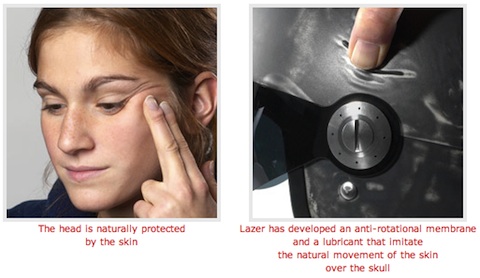Wrap 'leather' for helmet to increase safety
Philips Helmets Limited has introduced a helmet with artificial skin technology that reduces the risk of brain injury by 67.5%.
No one can doubt the helmet's effect on the safety of motorcyclists. However, in some cases, conventional helmets cannot withstand rotational brain injuries, or brain slippage.
When an accident occurs, if the head is impacted on a hard object or road surface, in addition to the direct impact from a hard object, the helmet will be twisted (slipped) on the road surface with extremely fast speeds. The head of the riders thus slipped.
Because the head is rotated at a speed so fast, the brain inside the head will not keep up, the delay is calculated in a few milliseconds. As a result, the nerves and blood vessels in the brain are twisted together and can break. Consequences, victims are paralyzed or die.
Lazer Helmet SuperSkin has a layer of artificial leather around it, with a gel-like solution underneath. This arrangement has a lubricating effect, which helps the skin slide back and forth on the hat's hardware.

Human face is protected by natural skin.Lazer helmets have artificial skin and a gel-like solution that helps the caps to move like human skin.
When the accident happened, the head of the person hit the road, the artificial skin would come in contact with the first road surface and be swung, even torn. The hat's hardware will also be screwed up but at this point the torque and the sliding speed have greatly decreased because the gel absorbs most of the initial force.
Therefore, the head and brain will no longer be rotated at great speed, the nerves will not be shaken.
Philips Helmets Limited helmets cost 15 years of research and development to be tested at Louis Pasteur University, Strasbourg (France). As a result, the risk of traumatic brain injury decreased by 67.5%.
- High-tech helmet
- Video: The process of camouflage the helmet of American soldiers like magic
- Helmet heard the thought
- 3 in 1 helmet
- MindRider - Helmet reads the driver's ability
- Helmet invisible
- Paper helmets can be folded
- Intelligent helmet auto-rescue
- Smart Helmet saves unconscious driving
- Video: Development history of the racing helmet
- Vozz RS 1.0: It's time to change the traditional helmet design
- 10 ways to use food wrap super convenient but you never know
 'Barefoot engineer' invents a pipeless pump
'Barefoot engineer' invents a pipeless pump Process of handling dead pigs due to disease
Process of handling dead pigs due to disease Radiometer
Radiometer Warp Engine: Technology brings us closer to the speed of light
Warp Engine: Technology brings us closer to the speed of light Does exercising our minds a lot help us burn excess calories?
Does exercising our minds a lot help us burn excess calories?  How did Egyptian mummies remove the brain from the body?
How did Egyptian mummies remove the brain from the body?  Shocking evidence that near-death experiences are real in people who have had cardiac arrest
Shocking evidence that near-death experiences are real in people who have had cardiac arrest  AI has been able to accurately reproduce more than 80% of images in the human brain.
AI has been able to accurately reproduce more than 80% of images in the human brain.  Neuralink tests controlling a robotic arm with thoughts
Neuralink tests controlling a robotic arm with thoughts  Elon Musk's ambition to merge humans with AI
Elon Musk's ambition to merge humans with AI 